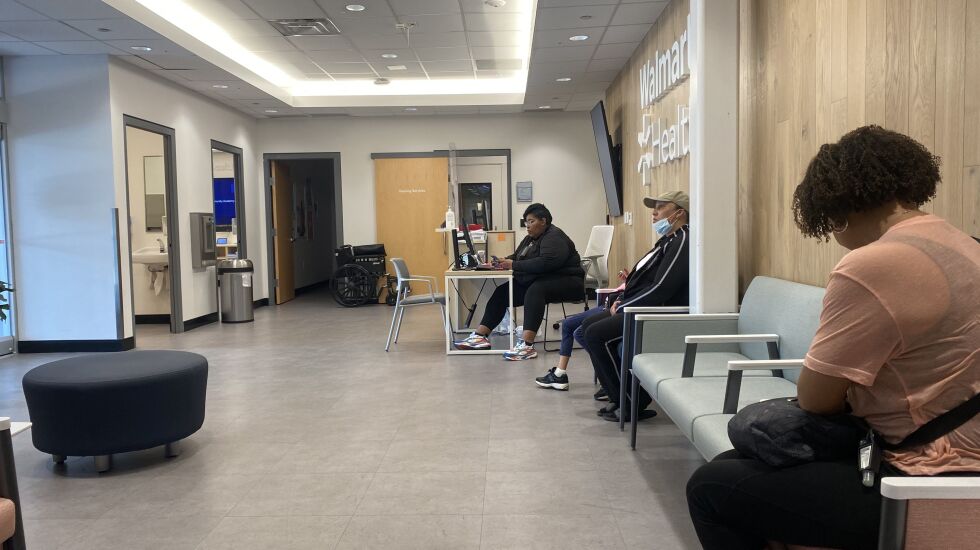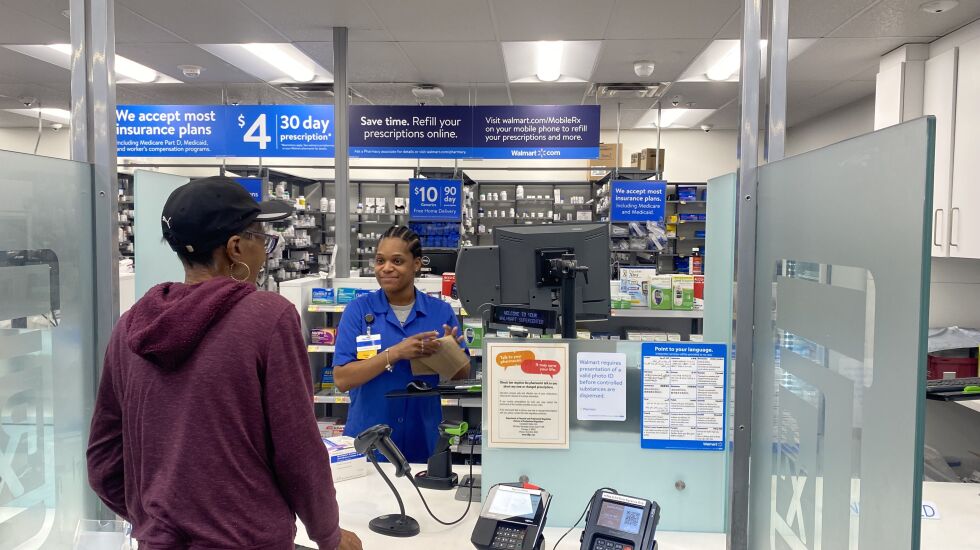
Regina Dickey went for an appointment at a new primary care clinic in Chatham on Tuesday. The clinic is newly furnished and close to home, and she thought she’d come again but was disappointed to learn she’d never get the chance.
Dickey, 38, is in fine health, but the clinic where she went and the store it’s attached to — a Walmart Supercenter on the South Side — is not, according to its owners.
The Supercenter is one of four Chicago supermarkets that Walmart announced Tuesday will close by Sunday, joining other grocery stores — particularly on Chicago’s South and West sides — that have closed in recent months.
In addition to the Chatham Supercenter, Walmart Health center and Walmart Academy, at 8431 S. Stewart Ave., the other stores closing are the Kenwood Neighborhood Market, at 4720 S. Cottage Grove; Little Village Neighborhood Market, at 2551 W. Cermak Road; and Lakeview Neighborhood Market, at 2844 N. Broadway.

“This is going to cause a lot of issues for people in the community,” Dickey said. “Not cool.”
Dickey said she shopped there and at the Kenwood Walmart regularly.
“It’s like they didn’t even give a thought to the people in these communities,” Dickey said.
Four Walmart stores will remain open in the city: Walmart Supercenter in Belmont Cragin, at 4626 Diversey Ave.; a Supercenter in Austin, at 4650 W. North Ave; in Pullman, a Supercenter in Pullman at 10900 S. Doty Ave; and Walmart Neighborhood Market Gresham, at 7535 S. Ashland Ave.
The Chicago portfolio of stores overall has been “unprofitable” since the company came to the city, Walmart said Tuesday in a news release.
The Chicago stores lose “tens of millions each year,” and yearly losses have almost doubled since 2018, the release said.
“Over the years, we have tried many different strategies to improve the business performance of these locations, including building smaller stores, localizing product assortment and offering services beyond traditional retail,” the company’s announcement said.
A few hours after the announcement, Elijah Straight stood outside the Chatham store, watching the stream of people in and out, and said he could not believe profitability was the issue.
“It’s like this almost every day,” said Straight, 38.
The Supercenter closing would be crippling for the area, he said.
“It brings jobs, it brings economic growth, and in this part of the city, there’s really no supermarkets around here.”

Marcus Jackson, who came to the health center for an appointment Tuesday, figured there was more to it than what the company said.
Jackson said he knew that theft was a big issue for the company, but, like others, felt there had to be other solutions, from improving security to eliminating the automatic checkout.
“You came in and filled a void — now you’re taking it away,” said Jackson, 38.
According to Walmart, city and community leaders have been receptive to meetings regarding challenges over the years.
“As we looked for solutions, it became even more clear that for these stores, there was nothing leaders could do to help get us to the point where they would be profitable,” the announcement said.
Chatham’s health clinic and pharmacy have been quality, affordable places for underinsured people to get care, said Nedra Fears, executive director of Greater Chatham Initiative.
Fears said the closure is a “really big deal” for residents in and outside of the community.
“It’s one of the most frequented places to visit (in Chatham),” she said. “It’s also a regional destination. It’s not only for people in our neighborhood. I was just there on Sunday, and it was packed.”
Fears said she wishes the retailer would say more about why Chicago’s stores are not profitable.
“It makes me very sad that the retailers can’t figure it out and don’t invite the community to help them figure it out,” she said.
Most people she’s spoken to have been upset about the closure, Fears said.
“No one is reveling in having a big-box store that takes up two blocks, empty,” she said.
Homero Castellanos of Pilsen, 63, was surprised to hear that the Little Village Neighborhood Market will close.

He said he shops there frequently for its value but he isn’t concerned that it’s closing because there is a Walmart Supercenter nearby.
Castellanos said wife, who shops more than he does, already skips the smaller neighborhood store for the Supercenter.
“She prefers it,” he said. “I think because it is bigger.”
Ald. Jason Ervin (28th), whose ward is home to the Little Village Neighborhood Market, said he is “extremely disappointed” about the closures. The chair of the City Council’s Black caucus said the loss of these stores hurts already underserved areas in Chicago.
“The West and South sides need committed partners to reverse decades of disinvestment and discrimination,” Ervin said. “I hope Walmart will work hard to invest in the communities in Chicago that desperately need their presence.”
Pharmacies at the locations will continue to serve patients for 30 days after each store’s closure, and all store associates are able to transfer to other Walmart or Sam’s Club locations.
Pamela Vaughn of Gresham watched the pharmacy line at the Chatham Supercenter ebb and flow as she waited for her prescription Tuesday.
“I hate that this is happening,” said Vaughn, 71. “I’ve been in his neighborhood 58 years, and I’ve seen a lot of changes, and it’s disheartening to see a company this size could shut down like this.”
Vaughn said she had been coming to the pharmacy for her blood pressure medication since it opened because it felt safer and because she had developed a rapport with the pharmacists.
She knew the company promised employees jobs at other Walmart stores, and she said she would follow the pharmacists from the Supercenter elsewhere but feared she wouldn’t feel safe going alone anymore.
She wondered if there was anything the community could do to keep the store from closing, but in the meantime said the immediacy of it the decision left a bad taste in her mouth.
“For older people and Black people, it’s a slap to our face,” she said. “We need this store.”

Contributing: Mitchell Armentrout
Michael Loria and Mariah Rush are staff reporters at the Chicago Sun-Times via Report for America, a not-for-profit journalism program that aims to bolster the paper’s coverage of communities on the South Side and West Side.







